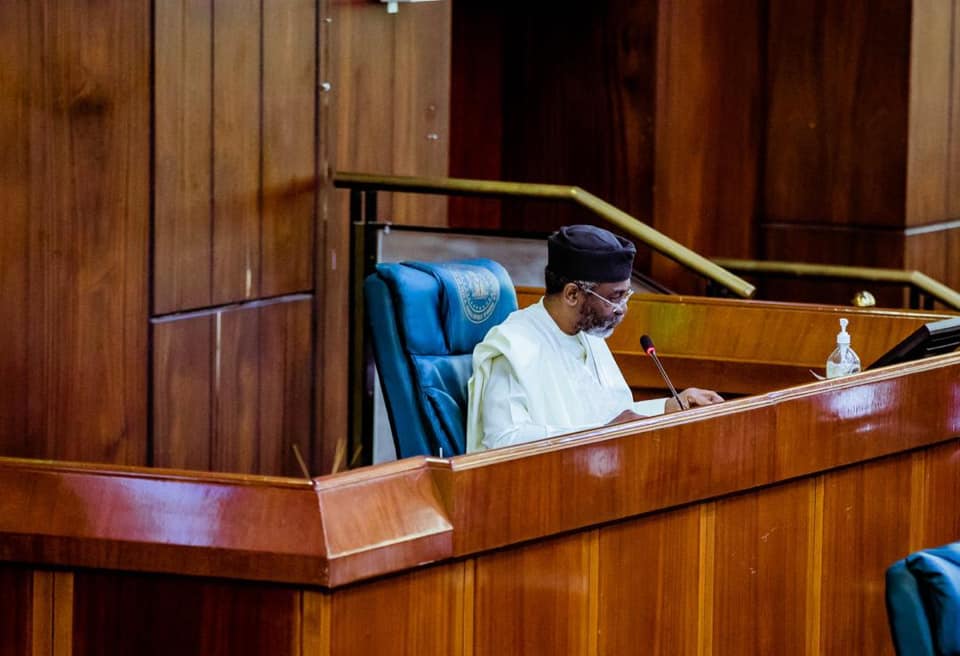The House of Representatives on Wednesday, September 30, 2020, approved the 2021-2023 Medium Term Expenditure Framework with a new borrowing plan of N4.28 trillion, (including foreign and domestic borrowings) for the 2021 fiscal year
The House approved N3.12 trillion for debt and another N220 billion as sinking funds for the year 2021 while adopting a $40 benchmark, N379/$ exchange rate, a daily oil production of 1.8 mbpd, and an inflation rate of 11.95 percent
The House approved the recommendation of its joint committee on Finance, Appropriation as well as Budget and National Planning for the parameters for the 2021 Budget of N13.08 trillion.
The Joint Committee said it observed that majority of revenue-generating agencies of a government engaged in arbitrary and frivolous expenditure, making it difficult to determine actual government earnings, with a large percentage of this expenditure being extra-budgetary.
It said further that many revenue-generating agencies expended enormous funds on overhead and recurrent expenditure, including huge personnel cost that was difficult to reconcile with the number of staff on their nominal payroll, thereby reducing their operating surplus.
It also observed that many government agencies engaged either in outright non-remittance or under remittance of operating surplus due to the Consolidated Revenue Fund in breach of the Fiscal Responsibility Act, 2007, and the extant laws that created the agencies.
The Joint Committee also said in their report that the Office of the Accountant-General of the Federation and the Budget Office “are not able to track the entire revenue stream of the Federal Government as at when generated due to inadequate technology to harness and connect all revenue generating agencies to a central management system.
It also said that many of the science and technology-oriented agencies, particularly the National Agency for Science and Engineering Infrastructure, National Office for Technology Acquisition and Promotion, and the Nigeria Communication Satellite Limited had far greater potentials for revenue generation than they are currently doing.
The lawmakers also agreed that the joint committee and the Auditor-General of the Federation should conduct a detailed analysis of all Ministries, Departments, and Agencies, MDAs, funded through the Federal Government Budget to identify more Agencies that need to be taken off the budget wholly or partially and those that need to be retained, to further reduce the deficit burden of the Federal budget and free up more resources for other critical projects.
Other approved parameters are include GDP growth Rate of 3.00 percent; FGN retained revenue of N7.89 trillion with a fiscal deficit -N5.20 trillion (including GOE’s);
Pension, Gratuities and Retirees Benefits is to gulp N520.69 billion); with a total recurrent (Non-Debt) of N5.67 trillion and Personal Costs (MDAs + GOEs) of N3.58 trillion with special intervention (recurrent) taking N350 billion while special Intervention (capital) will gulp N20 billion
The House further approved the recommendations by the joint Committee as follows:
- Mandate the Committees on Finance and National Planning and Economic Development in partnership with the Ministry of Finance, Budget and National Planning and the Auditor General of the Federation to conduct a detailed analysis of all Ministries Departments and Agencies (MDAs) funded by the Federal Government of Nigeria Budget to identify more Agencies that need to be taken off the budget wholly or partially and those that need to be retained, to further reduce the deficit burden of the Federal budget and free up more resources for other critical projects;
- That on Auto Policy, the Committee recommends downward review of the levy imposed on Imported Vehicles to 15% and 20% on both Commercial Vehicles (Buses and Trucks) and Luxury Vehicles respectively;
- That the Committees recommends enhancement of capacities of the Federal Inland Revenue Services (FIRS), Personnel and Technology Deployment to boost Non-Oil Revenue Collections;
- That the House do commence the process of amending the Establishment Acts of all the Revenue Generating Agencies to conform with the provisions of the Fiscal Responsibility Act (FRA) 2007;
- Recommends the amendment of Sections 21 and 22 of the (FRA) 2007 to conform with the current circular on expenditure to Revenue ratio of 70/30 and 60/40 issued by the Executives;
- That the Nigeria Customs Service device plans and policies to facilitate trade as the already signed African Continental Force Trade Area (AFCTA) will reduce Revenue, while collaborations with neighbouring countries are improved for increased transnational/ trans–border trade for more IGR by the Nigeria Customs Service (NCS).
Source: The Nation







